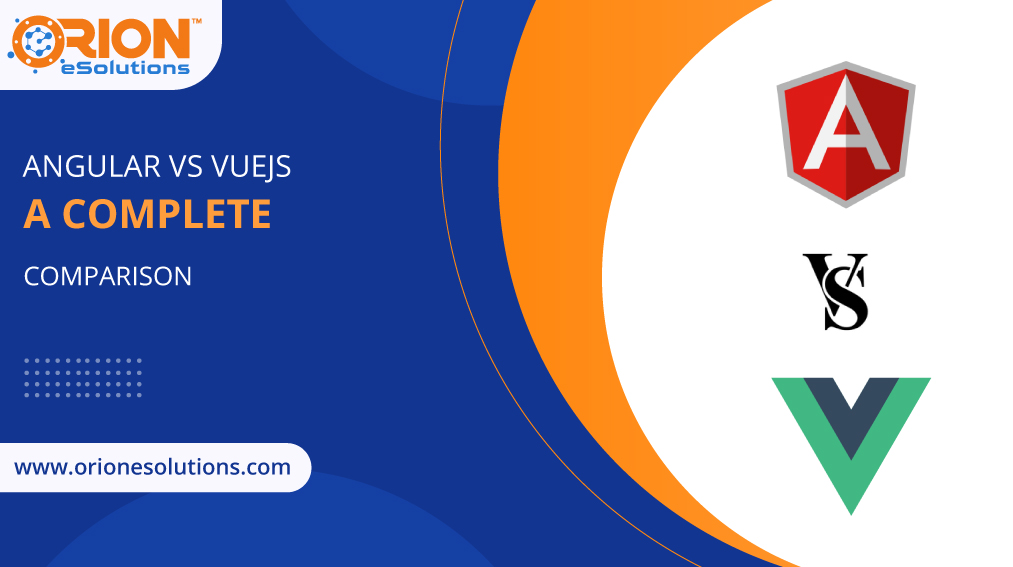A complete comparison between AngularJS and VueJS
One of the most significant decisions to make while developing a new application is which front-end technology will serve best? The JavaScript frameworks are quite popular when it comes to some of the biggest tech giants making the most of their benefits during web application development. Because there are so many frameworks available, web app developers always need to be sure about their choice.
This ever-evolving and the technology-efficient world need web application developers to develop an interactive web application for different businesses. Regardless of whether you are a web app developer or a business owner, your tech guide must be kept handy so that you make better decisions.
Most web application development companies in India increasingly argue over choosing the best tool for JavaScript web applications. In an attempt to solve this confusion we are here with a blog on AngularJS vs VueJS: Which one is the best?
Here, we will compare both these frameworks on multiple factors. In addition, we will also find out what is it that makes these frameworks stand apart and how are they useful in the world of web application development.
ANGULAR
Angular is an open-source framework that was developed by Google in the year 2016. It focuses majorly on developing dynamic websites and applications. It is a TypeScript framework that is based on the MVC architecture and falls under the category of MEAN stack. Additionally, it offers a wide range of code editors.
To put this in simple terms, Angular is one of the heaviest and highly functional frameworks having a steep learning curve. Therefore, to get the best functionality of this framework while creating dynamic, large scale and real-time applications, it is necessary to hire angular developers.
VUE
Until recently, Vue has been emerging as a very popular framework that is being increasingly used for front end development while facilitating faster and error-free performance. Developed in the year 2014, Vue promises to offer higher customizability and user-friendliness for the new learners.
It is based on the Virtual DOM architecture since it is capable of focusing a lot more on the application features as opposed to writing lengthy codes. In addition, Vue also enables server-side rendering while boosting the page execution on the client-side. This eventually ends up in offering a highly rich user experience.
DIFFERENCES BETWEEN ANGULAR AND VUE
- INTEGRATION: Angular is a JavaScript framework that enables the web development process to become much easier. This is because Angular allows easy integration with third-party components and other different JavaScript-based technologies. As opposed to this, Vue is a rather versatile and pretty flexible framework. It helps in facilitating the integration of front end libraries very easily.
- DEVELOPMENT COMPLICATION: Angular is a lot more complex as compared to Vue in terms of the design and API. If it is a nontrivial application development then it can take a lot more time with Angular as compared to Vue. The development of a nontrivial application takes a lesser time while integrating with Vue. In terms of design and API, Vue is much simpler.
- FLEXIBILITY: Angular is known to be one of the most highly flexible frameworks since it provides official support to multiple systems without any limitations or restrictions. On the other hand, if we talk about Vue then it is not as flexible as Angular. It is rather pretty rigid. Vue requires web developers to abide by some rules while working on the application. It also provides flexibility for modular solutions.
- PERFORMANCE: In terms of performance, Angular has been doing pretty well until now. It is well known for offering one of the fastest performances. Irrespective of whatever the platform might be, Angular offers the same metrics almost everywhere. When it comes to performance, Vue is also not much different than Angular. Rather, it also delivers the same performance. Therefore, both of these frameworks perform on different kinds of issues while at the same time addressing the important issues.
- TWO-WAY BINDING: Angular uses the process of two-way data binding between the scopes. Moreover, it also supports asynchronous services while allowing the developers to create third-party components that could be integrated with the app. In contrast to this, Vue is based on a one-way data flow between the components. It helps in nontrivial web application development quickly.
- TYPESCRIPT: The learning resources offered by Angular are based on Typescript. This feature helps web developers to boost the process of web application development. Although Vue also has the Typescript functionality but it is not in any use at the present time.
HIGHLIGHTS OF ANGULAR
- Angular works perfectly well when it comes to developing real-time and large scale web applications.
- It has a great impact while integrating with instant messaging applications.
- It enables in developing object-oriented programming and a great zeal to learn TypeScript.
- Angular also helps in easy and reliable scalability.
HIGHLIGHTS OF VUE
- Vue is best suited for developing a single page and a lightweight application.
- Vue helps high speed and high performance.
- It is one of the lightest frameworks.
- Vue has an easy learning curve. Therefore, it is pretty easy to work with it.
CONCLUSION
Coming down to a final choice between the two, it can be said that both Angular and Vue can be used in the web development of robust applications. Where Angular requires a team of expert developers to create a fully integrated app in lesser time and cost, Vue can be handled by beginners as well and does not a team of experts.
Where Angular is best used for developing a large-sized application with good runtime performance, Vue is suitable for small-sized applications, is easier to download, and facilitates an easy application development phase.
Both these frameworks come with their own set of advantages and disadvantages. Choosing the right framework is finally dependent on the requirements of the developer and the project.








